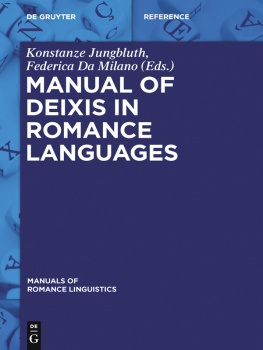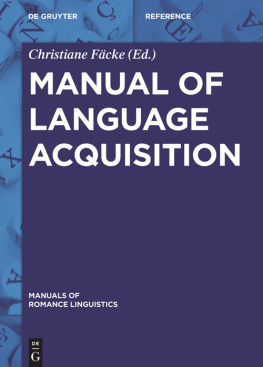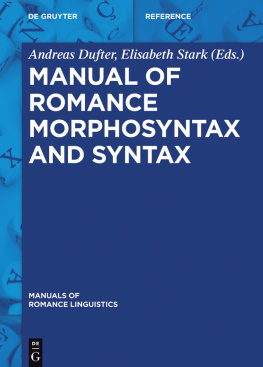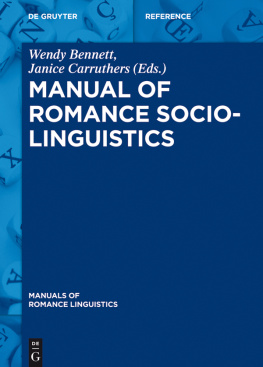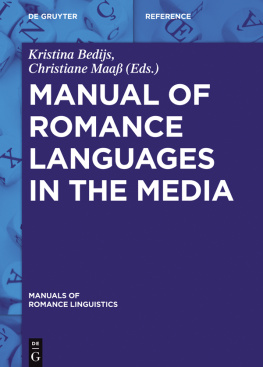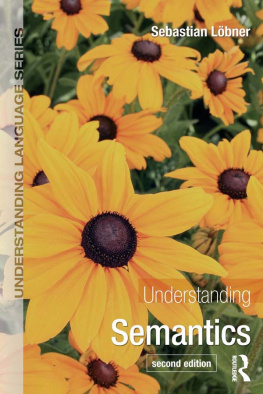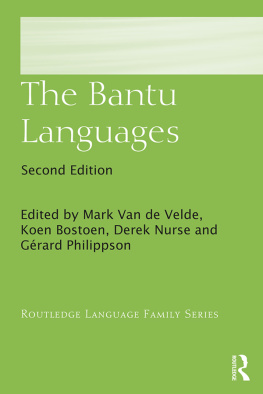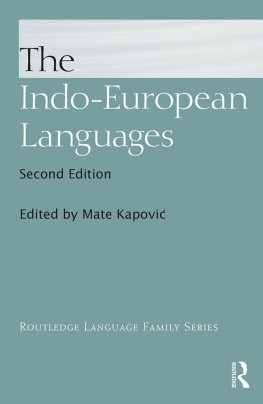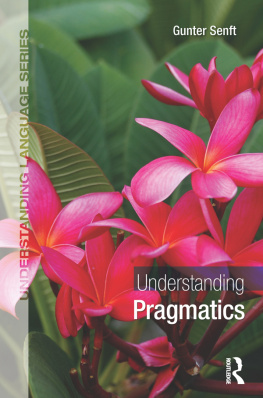- Konstanze Jungbluth and Federica Da Milano
0 Introduction - Alexandra Corina Stavinschi
1 Romanian - Ignazio Putzu
2 Sardinian - Federica Da Milano
3 Italian - Adam Ledgeway
4.1 Varieties in Italy - Michele Prandi
4.2 Varieties in Italy 2: Alpine Varieties - Martina Irsara
5 Ladin - Claire Beyssade
6 French - Carolin Patzelt
7 French Varieties outside of France - Neus Nogu-Serrano
8 Catalan - M a Elena Gmez Snchez and Konstanze Jungbluth
9 European Spanish - Laura D. Ferrari
10.1 Spanish Varieties of Latin America 1: South America - Karolin Moser
10.2 Spanish Varieties of Latin America 2: Mexico and Central America - Helena Topa Valentim
11 European Portuguese - Konstanze Jungbluth and Rita Vallentin
12 Brazilian Portuguese - Konstanze Jungbluth
13 Creoles
- Andreas Dufter
14 Semantics - Johanne Peem6ller
15 Structuralism - Kasia M. Jaszczolt
16 Contextualism - Rita Finkbeiner and J6rg Meibauer
17 Indexicalism - Javier Gutirrez-Rexach
18 Minimalism - Wiltrud Mihatsch
19 Cognitive Linguistics - Mnica Cavalcante
20 Referentiality - Franois Jacquesson
21 Typology
- Jens Ldtke
22 From Latin and Vulgar Latin to Romance Languages - Cline Guillot
23 From Old French and Middle French to Contemporary French - Paolo Ramat
24 Language Change and Language Contact - Martina Ebi
25 Encoding Deictic Relations in Japanese - Maurizio Gnerre
26 Encoding Deictic Relations in Mesoamerican Languages
- Lorenza Mondada
27 Social Interaction - Nicole Richter and Dagna Zinkhahn Rhobodes
28 Corpus Linguistics - Ellen Fricke
29 Gesture - Friedrich Lenz
30 Discourse Deixis

Manual of Deixis in Romance Languages
MRL 6
Manuals of
Romance Linguistics
Manuels de linguistique romane
Manuali di linguistica romanza
Manuales de lingstica romnica
Edited by
Gnter Holtus and Fernando Snchez Miret
Volume 6

ISBN 978-3-11-031767-1
e-ISBN (PDF) 978-3-11-031773-2
e-ISBN (EPUB) 978-3-11-039356-9
Library of Congress Cataloging-in-Publication Data
A CIP catalog record for this book has been applied for at the Library of Congress.
Bibliografische Information der Deutschen Nationalbibliothek
The Deutsche Nationalbibliothek lists this publication in the Deutsche Nationalbibliografie; detailed bibliographic data are available on the Internet at http://dnb.dnb.de .
2015 Walter de Gruyter GmbH, Berlin/Boston
www.degruyter.com
Manuals of Romance Linguistics
The new international handbook series Manuals of Romance Linguistics ( MRL ) will offer an extensive, systematic and state-of-the-art overview of linguistic research in the entire field of present-day Romance Studies.
MRL aims to update and expand the contents of the two major reference works available to date: Lexikon der Romanistischen Linguistik ( LRL ) (19882005, vol. 18) and Romanische Sprachgeschichte ( RSG ) (20032008, vol. 13). It will also seek to integrate new research trends as well as topics that have not yet been explored systematically.
Given that a complete revision of LRL and RSG would not be feasible, at least not in a sensible timeframe, the MRL editors have opted for a modular approach that is much more flexible:
The series will include approximately 60 volumes (each comprised of approx. 400600 pages and 1530 chapters). Each volume will focus on the most central aspects of its topic in a clear and structured manner. As a series, the volumes will cover the entire field of present-day Romance Linguistics, but they can also be used individually. Given that the work on individual MRL volumes will be nowhere near as time-consuming as that on a major reference work in the style of LRL , it will be much easier to take into account even the most recent trends and developments in linguistic research.
MRL 's languages of publication are French, Spanish, Italian, English and, in exceptional cases, Portuguese. Each volume will consistently be written in only one of these languages. In each case, the choice of language will depend on the specific topic. English will be used for topics that are of more general relevance beyond the field of Romance Studies (for example Manual of Language Acquisition or Manual of Romance Languages in the Media ).
The focus of each volume will be either (1) on one specific language or (2) on one specific research field. Concerning volumes of the first type, each of the Romance Languages including Romance-based creoles will be discussed in a separate volume. A particularly strong focus will be placed on the smaller languages ( linguae minores ) that other reference works have not treated extensively. MRL will comprise volumes on Friulian, Corsican, Galician, Vulgar Latin, among others, as well as a Manual ofJudaeo-Romance Linguistics and Philology . Volumes of the second type will be devoted to the systematic presentation of all traditional and new fields of Romance Linguistics, with the research methods of Romance Linguistics being discussed in a separate volume. Dynamic new research fields and trends will yet again be of particular interest, because although they have become increasingly important in both research and teaching, older reference works have not dealt with them at all or touched upon them only tangentially. MRL will feature volumes dedicated to research fields such as Grammatical Interfaces, Youth Language Research, Urban Varieties, Computational Linguistics, Neurolinguistics, Sign Languages or Forensic Linguistics. Each volume will offer a structured and informative, easy-to-read overview of the history of research as well as of recent research trends.
We are delighted that internationally-renowned colleagues from a variety of Romance-speaking countries and beyond have agreed to collaborate on this series and take on the editorship of individual MRL volumes. Thanks to the expertise of the volume editors responsible for the concept and structure of their volumes, as well as for the selection of suitable authors, MRL will not only summarize the current state of knowledge in Romance Linguistics, but will also present much new information and recent research results.
As a whole, the MRL series will present a panorama of the discipline that is both extensive and up-to-date, providing interesting and relevant information and useful orientation for every reader, with detailed coverage of specific topics as well as general overviews of present-day Romance Linguistics. We believe that the series will offer a fresh, innovative approach, suited to adequately map the constant advancement of our discipline.
Gnter Holtus (Lohra/Gttingen)
Fernando Snchez Miret (Salamanca)
June 2015
Acknowledgements
The editors, together with the 32 authors, are very happy to share the outstanding result of this collective effort. Actually, the group of contributing people was much larger. We gratefully recognize the valuable contributions of several anonymous reviewers who formed part of our external review process, along with the contribution of nearly all of the authors themselves to the internal review process.
We should also recognize the names of several other colleagues involved in the writing process, and of English experts who found the correct idiomatic expressions in different far-flung areas:
Next page
